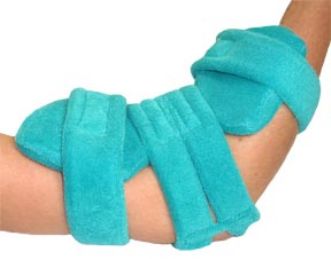
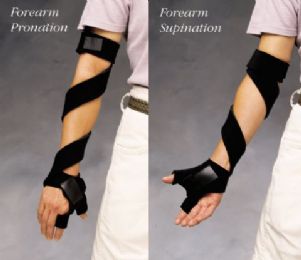
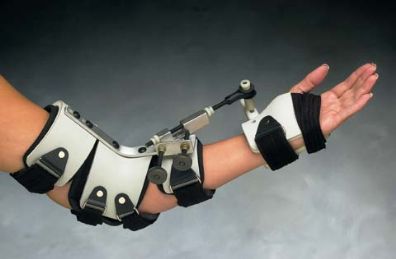
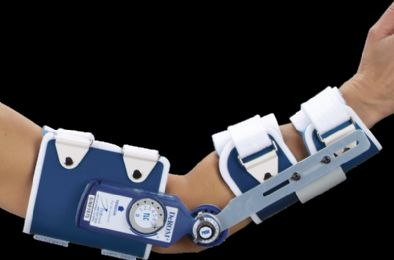
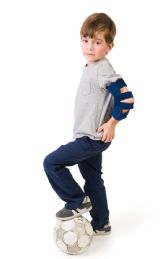
.jpg&newheight=260&quality=80)
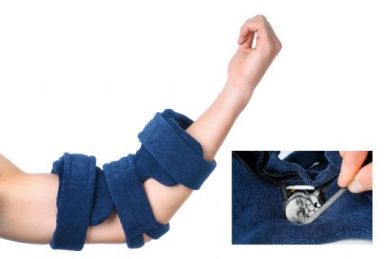
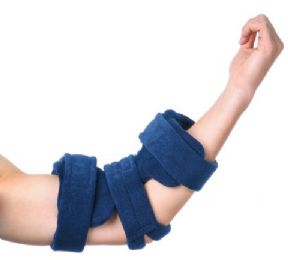
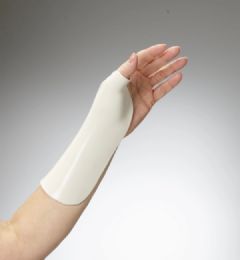
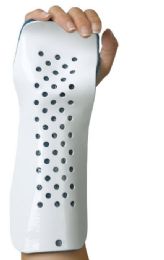

What is a Dynamic Splint?
Range of motion limitations, or contractures, can result from a variety of neurologic or orthopedic conditions. Dynamic splinting helps restore normal mobility to maximize strength and function, and to improve the outcome. A contracture happens when the connective tissue such as tendons, ligaments and joint capsules become scarred, or when the muscle tissue shortens. Instead of performing a quick stretch which may not be maintained with elastic tissue, a low-load prolonged stretch (LLPS) stimulates a plastic change in the tissue length.
Studies show that gains in range of motion are best when the tissues are held at a constant state of mild tension for a minimum of one hour. Early intervention, 1 to 3 weeks after the injury, with LLPS is the most effective time in restoring range of motion. The goal of dynamic splinting is to stress shortened or scarred connective tissue with a LLPS to help non-traumatic, more permanent tissue remodeling. As the tissue lengthens, range of motion is improved. Dynamic splinting may help reduce rehabilitation time, and is generally worn while sleeping or at rest.
A dynamic splint uses a tension spring which is built into the brace, usually at the mechanical hinge. The spring gives mild, long duration stress on the restricted joint to help in tissue remodeling. The tension spring can be adjusted for less or more tension to achieve the range of motion goals. The dynamic splint should have adjustable cuffs, struts and pads to reduce pressure points and provide a comfortable fit. Simple adjustment and fitting controls should be built into the device, which eliminates the need for tools. The splint should be easy to apply and to remove for the individual.
How do I Choose the Best Forearm Brace?
A forearm injury not only causes discomfort and pain, but it can also impact an individual’s mobility. Treating these problems with a proper forearm brace is very important. How effective a forearm brace will be usually depends on the nature of the injury. Other details, such as arm movement capability and pain control, should also be considered when choosing the proper forearm brace. When an injury happens to the forearm, whether it is from a sudden accident or another longer term wear and tear condition, many medical professionals will recommend a forearm brace. A brace is made of either hard or soft material and usually fits over the portion of the arm between the hand and the elbow, but in some cases it may cover the elbow and maybe the entire arm. The best type of forearm brace normally depends on the extent and nature of the injury.
In some tendon or muscle inflammatory conditions, such as tennis elbow, an individual may want to maintain the ability to move the arm in a reasonable way. Physical movement may help to increase the blood flow to the injured areas and help the tissue heal. In this case, a compression brace may give the best type of forearm support. These braces are normally sleeves that wrap around the arm and offer protection for the connective tissues and muscles. They can help reduce swelling as well, by blocking and pressurizing fluid buildup in the area. The brace is usually made of soft, pliable materials and it covers less of the arm so its movement is not restricted.
Other injuries, like sprains or broken bones, may need forearm immobilization. These types of injuries may require arm movements to be restricted to prevent further damage and to encourage healing. Hinged braces which connect and cover the upper arm to the lower arm may be more therapeutic in these cases. Different degrees of braces focus on different movement restrictions and injuries. For example, a hyperextension brace prevents the elbow joint from bending in the wrong direction and causing more injury. An overload forearm brace stops the harmful force caused by motions that certain athletes may go through, such as throwing. Maximum immobilization is accomplished through the forearm splint. It is a tough, mostly inflexible device that extends up the wrist and is commonly made of plastic, elastics or fiberglass.
Different forearm brace models contain added materials that may be beneficial. Many are made of thin material and have easy to apply Velcro straps for a convenient use. Also, forearm braces can hold adjustable magnets or air to provide an extra means to reduce pain and add elbow support. Other temperature controlled features and gel packs can also help with pain. As with any medical problem, all potential treatments should be discussed with a medical professional.
How do I Choose the Best Elbow Brace?
An elbow brace helps keep the elbow supported and protected, and choosing the best one requires knowing the right type that is needed for the particular injury or issue. Depending on how much support the elbow needs can vary and how much flexibility it should have while the device is being worn. Other considerations include how easy it can be cleaned and how well the brace fits. For minor injuries, an elbow brace can be more like a nylon or cloth brace and can usually have a built in support, such as a piece of plastic or aluminum. These types of braces allow for more flexibility, which is helpful in the latter stages of the healing process, or if a brace in needed for support due to a chronic problem. One thing to consider with a cloth type brace, is determining if it has antibacterial properties. Many do, which can be helpful to avoid a build-up of bacteria or fungus.
Recovery from a serious elbow surgery or injury often requires the elbow to be locked in place or to keep the movement to a minimum. In these cases, an elbow brace made of metal or harder plastic may be needed. Many of these types of braces have a built in goniometer, which allows the angle of the brace to be set, either in locked positon or for limited movement to a specific angle. Regardless of the type of brace chosen, it should fit snugly and offer support without cutting off circulation. If it has padding, it should be removable for washing.
Rehabmart is pleased to carry a wide variety of innovative elbow and forearm orthoses from top quality vendors, such as Kinetec USA, DeRoyal, Comfy Splints, Orthomerica, North Coast, Restorative Care of America, Vertaloc, and Chattanooga.
Hulet Smith, OT
Rehabmart Co-Founder & CEO
lb